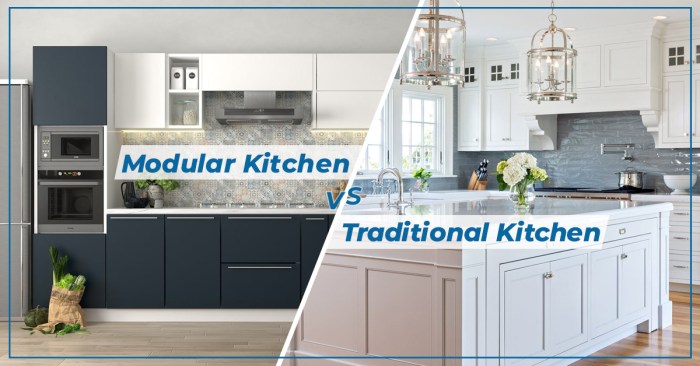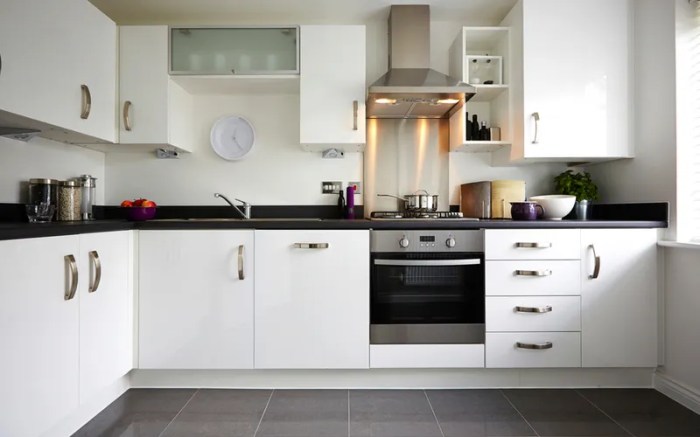Modular Kitchen vs. Traditional Kitchen: Pros and Cons – Delving into the realm of kitchen design, the debate between modular kitchens and traditional kitchens rages on. Both options boast unique advantages and drawbacks, making the choice a matter of personal preference and specific requirements. In this comprehensive guide, we will explore the pros and cons of each type, empowering you to make an informed decision that aligns with your lifestyle and aesthetic sensibilities.
Modular kitchens, characterized by their pre-fabricated units, offer flexibility, customization, and ease of installation. Traditional kitchens, on the other hand, exude durability, timeless style, and potential for higher resale value. As we delve into the intricacies of each option, you will gain valuable insights to guide your kitchen design journey.
Introduction

Modular kitchens and traditional kitchens are two popular options for homeowners. Both types of kitchens have their own advantages and disadvantages. In this blog post, we will discuss the key differences between modular and traditional kitchens so that you can make an informed decision about which type of kitchen is right for you.
The main difference between modular and traditional kitchens is the way they are constructed. Modular kitchens are made up of pre-fabricated units that are assembled on-site. This makes them much easier and faster to install than traditional kitchens, which are built from scratch.
Construction
Modular kitchens are typically made from a variety of materials, including wood, metal, and plastic. They are available in a wide range of styles and finishes, so you can find one that matches your taste and décor.
Traditional kitchens are typically made from wood. They are more customizable than modular kitchens, but they are also more expensive and time-consuming to build.
Pros of Modular Kitchens: Modular Kitchen Vs. Traditional Kitchen: Pros And Cons
Modular kitchens offer numerous advantages over traditional kitchens. Their flexibility, customization options, and ease of installation make them a popular choice for modern homeowners.
Modular kitchens are made up of pre-fabricated units that can be combined in various ways to create a customized kitchen layout. This flexibility allows homeowners to design a kitchen that perfectly suits their needs and space constraints.
Customization
Modular kitchens offer a wide range of customization options. Homeowners can choose from a variety of cabinet styles, finishes, and hardware to create a kitchen that reflects their personal taste. They can also select appliances and fixtures that meet their specific needs and preferences.
Cons of Modular Kitchens

While modular kitchens offer several advantages, they also have some drawbacks that potential buyers should be aware of before making a decision.
One significant drawback is the higher cost compared to traditional kitchens. Modular kitchens are typically more expensive due to the materials used, the precision engineering involved, and the labor required for installation.
Limited Design Options
Another potential drawback is the limited design options available with modular kitchens. Since modular kitchens are pre-fabricated, they come with a set of standard designs and sizes. This can limit the ability to customize the kitchen to specific tastes and preferences.
Pros of Traditional Kitchens
Traditional kitchens offer a timeless appeal, featuring durable materials, classic designs, and the potential for increased resale value. Their versatility allows for customization to suit specific needs and preferences.
One of the main advantages of traditional kitchens is their durability. Solid wood cabinets, granite countertops, and ceramic tiles are commonly used materials that can withstand daily use and maintain their appearance for years to come.
Timeless Style
Traditional kitchens embrace classic designs that have stood the test of time. They feature intricate moldings, raised panel doors, and elegant hardware that create a sophisticated and inviting ambiance. This timeless style ensures that traditional kitchens remain visually appealing even as trends change.
Increased Resale Value
Traditional kitchens are often seen as a valuable asset when it comes to selling a home. Their classic design and durable materials appeal to a wide range of buyers, which can lead to a higher resale value compared to more modern or trendy kitchen styles.
Cons of Traditional Kitchens
Traditional kitchens have certain drawbacks that may not be present in modular kitchens. These drawbacks can impact the design, installation, and overall functionality of the kitchen.
Limited Flexibility
Traditional kitchens are typically designed with fixed layouts and cabinetry, which limits flexibility in terms of customization and reconfiguration. This can be a significant issue if you want to change the layout of your kitchen or install new appliances that may not fit the existing space.
Higher Installation Costs, Modular Kitchen vs. Traditional Kitchen: Pros and Cons
Traditional kitchens often require more time and labor to install, which can lead to higher installation costs. This is because traditional kitchens involve custom-built cabinetry and countertops, which require skilled craftsmanship and precise measurements.
Outdated Designs
Traditional kitchens may have outdated designs that do not align with modern trends and styles. This can result in a kitchen that looks dated and does not reflect your personal preferences.
Closing Summary
Ultimately, the choice between a modular kitchen and a traditional kitchen hinges on your individual needs and preferences. Modular kitchens excel in flexibility and customization, while traditional kitchens prioritize durability and timeless appeal. By carefully considering the pros and cons Artikeld in this guide, you can make an informed decision that will result in a kitchen that not only meets your functional requirements but also reflects your unique style and aspirations.
FAQ Guide
What is the main difference between a modular kitchen and a traditional kitchen?
Modular kitchens utilize pre-fabricated units that can be assembled and customized, while traditional kitchens are built on-site using custom-made cabinetry and countertops.
Are modular kitchens more expensive than traditional kitchens?
The cost of a modular kitchen can be higher than a traditional kitchen due to the use of pre-fabricated units and the need for professional installation.
Do modular kitchens offer more design options than traditional kitchens?
Modular kitchens typically offer a wider range of design options due to the availability of pre-fabricated units in various styles and finishes.
Are traditional kitchens more durable than modular kitchens?
Traditional kitchens are generally considered more durable due to the use of custom-made cabinetry and countertops, which are often made from higher-quality materials.
